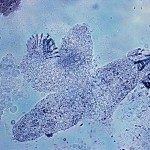About
Our knowledge on P. falciparum drug resistance has considerably progressed, particularly with the discovery of molecular markers associated to artemisinin derivatives and partner drugs (piperaquine, mefloquine) resistances. However, the race between effective antimalarial treatments and P. falciparum drug resistance is underway and must be won. The current observed pattern of ACT evolution in Southeast Asia seems to be similar of both chloroquine and sulfadoxine-pyrimethamine resistance in the past, before the dominant resistant lineage spreading to India and Africa. However, molecular tools are available for implementing large-scale, cost-effective and real-time monitoring. As multidrug resistance is still confined in Southeast Asia, we must take advantage of this unique situation and favors effective monitoring of P. falciparum drug resistance in endemic areas and anticipate any risks associated with the emergence and spread of the multidrug resistant parasites, through a global and structured surveillance project combining laboratory expertise, clinicians, epidemiologists and bio-informatics.
To date, Sanger sequencing allows the identification of major resistance alleles (an allele with >50% frequency), but this approach lacks of sensitivity to accurately identify minor alleles and mixed-infection P. falciparum genotypes (this is particularly important where an antimalarial drug can exert selection pressure on minor populations of drug-resistant parasites). Recent advances in next-generation sequencing (NGS) and bioinformatics have provided a high-throughput, scalable, and cost-effective approach for identifying and tracking molecular markers of resistance. NGS enables massively parallel sequencing, allowing more than 300 gigabytes of DNA to be read on a single flow cell, requires significantly less template DNA, has improved accuracy compared to conventional sequencing methods, and allows multiplexing of hundreds of samples and markers in a single run, all of which provide a significantly less expensive and faster approach for molecular surveillance of drug resistance. The utility of using a targeted amplicon deep sequencing approach for P. falciparum drug resistance surveillance has been demonstrated. Here, we propose to implement a fully integrated molecular and bioinformatic plateform for molecular surveillance. Our approach will allow to amplify, sequence (up to 96 samples in a single run), and analyze all polymorphisms, known minor and major resistance alleles, and novel alleles across six full-length P. falciparum drug resistance genes, including Pfcrt, Pfmdr1, Pfk13, Pfdhps, Pfdhfr, and Pf cytochrome b genes), along with polymorphic genes (i.e. msp1, msp2 and glurp) to genotype initial and recrudescent isolates.



